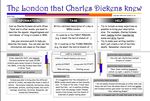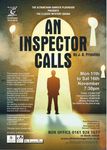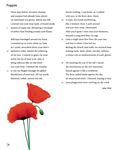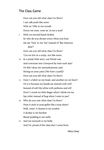STUDY PACK GCSE English Literature 2020/2021 - Kingston ...
←
→
Page content transcription
If your browser does not render page correctly, please read the page content below
CORE READING SKILLS
The GCSE English Literature specification focuses on
developing the students core analytical reading skills across both
examination papers.
READ/RESPOND To read a wide range of Classic Literature.
Being taught how to read, in depth and
respond personally and critically to texts.
ANALYSE To understand the ways in which Language,
Form and Structure are used to create
MEANING and EFFECT.
CONTEXT To understand the relationship between the
TEXT and its CONTEXT and how that impacts
on MEANING and INTERPRETATION.
WRITE To write critically and accurately using a wide
range of vocabulary and structures.
These four core skills provide the basis for you to analyse
different literary texts, these skills will develop progressively
through each of the units.
The Final Exam is divided into two parts;
Part 1
1. Shakespeare: You can study any Shakespeare play, recently
we have been studying Macbeth and we also watch a live
performance to aid our study of the text as well.
2. Post 1914 Literature: Here we study a modern play from
post First World War period. Students really enjoy our
study of “An Inspector Calls” by JB Priestley.Part 2
3. 19th century novel: There is a wide range Literature to
choose from, we have been studying “Strange Case of Dr
Jekyll and Mr Hyde” and “A Christmas Carol” in recent
years.
4. Poetry since 1789: in this unit you get the chance to
explore a wide selection of poetry from both the Romantic
and modern periods. Students seem to enjoy the reflective
and personal responses to writing that this unit affords.
Introduction To ShakespeareUnderstanding Shakespeare’s Language
LO: Read through quotations from some of Shakespeare’s most
famous plays (on the left) and re-write them into everyday
English
Translate Shakespeare’s language
into modern English Glossary
• Prithee, let us repair post-haste to avaunt - go away !
yonder tavern for a pot of sack and avouch - testify, prove
some capon. betimes - soon
• Yon wench seems in a choler. Her caitiff - cowardly
humour hath been thus sith days of wretch capon - chicken
yore. choler - irritable
temper con - study
• Ifaith, the caitiff hath been justly conceit - idea
punished for cozening divers
cozen - cheat
townsfolk.
divers - various
drab - an immoral
• Yon jade hath not the worth of a person entreat - beg,
groat. plead
e’re - before
• Con this page for divers conceits
• concerning husbandry. enow - enough
fain - inclined to
• Honestly, I think your face has the fardel - burden
look of a worn-out horse. fell - terrible
forsooth - truly,
• Go away! I’ve had enough of this
honestly groat - a small
quarrelling between you two.
coin humour - mood
husbandry -
• Honestly, I cannot drink this maintenance ifaith -
unpleasant wine. honestly
jade - worn out horse
• Let’s make our way to the pub andhave a talk about this terrible jakes - lavatory
business immediately. lest - unless
lief - (I had as lief)
• I suspect you’ve got some terrible prefer methinks - I
burden on your mind. think naught - nothing
noisome - harmful
• That wretched coward has cheated
o’er - over
you. I would be inclined to testify
how he has treated you in a parley - talk
harmful manner. pate - head
prithee - I beg you
quaff - drink
repair - make your way
to riggish - playful
rude - rough
sack - wine
sith - since or because
taper - candle
varlet - low-class rogue
visage - face
yore - ago or time
gone zounds! - God’s
wounds!
Task 2: SETTING AND CONTEXT
Research Shakespeare’s Life and fill in the missing words
Shakespeare’s life – a potted biography
Shakespeare was born in ..................[date].................... in the town
of ...................[place].................. Although his parents were fairly
prosperous and he was able to go to grammar school, he did not
go to university, perhaps because his father got into debt. At 18
he married ...................[name]................ , a woman of 26, who was
already pregnant.Queen .......................................... was on the throne when Shakespeare wrote his first plays. He was first an actor, but wrote poetry and ............................................ In those days there were no permanent theatres outside London and the theatre companies would put on plays .................................................................. Shakespeare became a part owner of ............................................ and was very successful, often performing for the queen. When she died, James I became king; luckily, he also liked Shakespeare’s plays. Shakespeare returned to Stratford when he retired and died on ..................[date]................... During his lifetime England fought wars against the Spanish and Catholics and Protestants plotted against each other, so it was a time of secrecy and spying. There were many outbreaks of .......................................... and the Globe even burned down during a performance, so Shakespeare did well to survive until he was 52 years old, which was an achievement in those days. THE GLOBE THEATRE APRIL 1564 STRATFORD-UPON-AVON THE PLAGUE ANNE HATHAWAY 23 APRIL 1616 IN OTHER TOWNS ELIZABETH I PLAYS Shakespeare’s life – a potted biography Shakespeare was born in ..................[date]..................... The town was called ...................[place].................. He married ...................[name]................ when she was 26 and pregnant. The Queen at the time was ........................................... Shakespeare was an actor, but he also wrote poetry and ............................................ There were not many theatres apart from in London. Groups of actors, called ............................................ put on plays in the other towns on feast days or at festivals.
Shakespeare became a part owner of a theatre in London called ............................................ The queen liked to watch plays there. When she died, James I became king; luckily, he also liked Shakespeare’s plays. Shakespeare returned to Stratford when he retired. He died on ..................[date]................... When he was alive, England went to war with Spain. At home, Catholics and Protestants plotted against each other. It was a time of secrecy and spying. There were many outbreaks of .......................................... which he lived through. The Globe burned down during a performance. Shakespeare lived to the age of 52 years old, which was an achievement in those days. THE GLOBE THEATRE APRIL 1564 STRATFORD-UPON-AVON THE PLAGUE ANNE HATHAWAY 23 APRIL 1616 STROLLING PLAYERS ELIZABETH I PLAYS TASK 3:CONTEXT/ WITCHCRAFT LO: Use the information below and summarise the most important points into the spider diagram
MACBETH: WITCHCRAFT
Witches were believed to have the following powers:
• They could speak with the devil, and with his help they
could communicate with the dead. Some could see into
the future.
• They could make people fall ill by using spells and potions,
and kill people at a distance.
• They could fly through the air, and make themselves
invisible at will.
• They use animals such as cats as disguises for the evil
spirits who serve them.
• They can cause bad weather and storms, affecting ships at
sea and spoiling the crops.
In other words, they could be blamed for everything and
anything that went wrong.
• A twelve-year-old crippled girl, Agnes Brown, testified on
oath that she saw the imp of Joan Waterhouse, whom she
accused of causing her lameness: it had, she said, the face
of an ape, a short tail, horns, a silver whistle round its neck
and carried in its mouth the key of the milk house door.
• In Scotland between 1590 and 1680, it is estimated that
4400 witches were executed. The best- known case is that
of the North Berwick witches in 1590-92. Among other
things, they were accused of worshipping the Devil in a
church at night, flying in sieves, raising storms and
attempting to murder King James I by melting a wax image
of him in a fire. The king took the threat seriously and
interrogated them himself. One witch, Agnes Sampson,
was able to whisper in his ear the words he and his wife
had spoken privately to each other on their wedding night,
which naturally impressed him. The North Berwick witches
finally confessed and were all executed.
• The following law was passed by Parliament on the wishes
of James I in 1563. It was not repealed until 1951.• That “if any person shall use any invocation or conjuration
of any evil or wicked spirit;
• Or shall consult, covenant with, entertain, employ, feed or
reward any evil or cursed spirit to or for any intent or
purpose;
• Or take up any dead man, woman or child out of the
grave, - or the skin, bone, or any part of the dead person,
to be employed or used in any manner of witchcraft,
sorcery, charm, or enchantment;
• Or shall use practice, or exercise any sort of witchcraft,
sorcery, charm or enchantment
• Whereby any person shall be destroyed, killed, wasted,
consumed, pined, or lamed in any part of the body
• That every such person being convicted shall suffer death.”
WITCHCRAFT
IN MACBETH
Post 1914 Literature
TASK 4:LO: To understand the theme of social responsibility in “An
inspector Calls”
Look carefully at these two quotations from An Inspector Calls.
The first is Arthur Birling giving Eric and Gerald the benefit of his
philosophy on life over after-dinner drinks.
I don’t want to lecture you two young fellows again. But what so
many of you don’t seem to understand now, when things are so
much easier, is that a man has to make his own way - has to look
after himself - and his family too, of course, when he has one -
and so long as he does that he won’t come to much
1. 1) Highlight what you think the key phrases are in this
speech.
2. 2) Complete three bullet points that summarise Mr
Birling’s beliefs about responsibility:
1. _________________________________________________
______________
2. _________________________________________________
______________
3. _________________________________________________
______________
This second quotation is the Inspector's final speech to the family
immediately before he leaves.
Responsibility
Look carefully at these two quotations from An Inspector Calls.
The first is Arthur Birling giving Eric and Gerald the benefit of his
philosophy on life over after-dinner drinks.I don’t want to lecture you two young fellows again. But what so
many of you don’t seem to understand now, when things are so
much easier, is that a man has to make his own way - has to look
after himself - and his family too, of course, when he has one -
and so long as he does that he won’t come to much harm. But
the way some of these cranks talk and write now, you’d think
everybody has to look after everybody else, as if we were all
mixed up together like bees in a hive - community and all that
nonsense. But take my word for it, you youngsters - and I’ve
learnt in the good hard school of experience – that a man has to
mind his own business and look after himself and his own.
But just remember this. One Eva Smith has gone - but there are
millions and millions and millions of Eva Smiths and John Smiths
still left with us, with their lives, their hopes and fears, their
suffering and chance of happiness, all intertwined with our lives,
with what we think and say and do. We don’t live alone. We are
members of one body. We are responsible for each other. I tell
you that the time will soon come when, if men will not learn that
lesson, then they will be taught it in fire and blood and anguish.
3) Answer the questions below in complete sentences:
a. How would you describe the style of language in this speech?
1. What do you think the Inspector is referring to when he
speaks of the ‘fire and blood and anguish’ that may
occur in the future?
2. What is Priestley using the character of the Inspector for
at this point in the play?
3. What is Priestley’s main message to the audience in this
speech?
4. Why do you think Priestley included this speech in the
play?
Task 5/ WHODUNIT?LO : Read the sequence of the plot story line. Decide whom you
would blame for Eva Smith’s death in “ An Inspector Calls”
A young woman has committed suicide.
The events leading up to her death were as follows:
Ø Whilst working in a factory, in bad conditions and for low
pay, she was part of a group, which organised a strike. Her
employer sacked her for being a troublemaker. Í
Ø She then got a job as a sales assistant in an expensive
clothes shop. An important customer (in a bad mood)
thought she was giggling at her, and used her influence to
get the girl sacked.
Ø ́ She then became despondent and thought about
becoming a prostitute. She got picked up in a bar by a man
who pitied her and ‘keeps’ her for several months. She fell
in love with him, but he was forced to dump her because
he was engaged to be married.
Ø She went back to the same bar, thinking again of becoming
a prostitute to earn a living, when she was picked up by a
younger man, who saw her twice, but then left her.
Ø She found she was pregnant and applied for help to a
charity. The head of the charity refused her help because
she didn’t believe her.
Ø WHO IS TO BLAME FOR HER DEATH?
TASK 6/SOCIAL CONTEXT/WOMENLO: Read through the information below about womens’ lives
during the post world war periods. Compare women lives to
then and now in the table that follows.
Act 3
The end of this play would have been hard-hitting with an
audience that had seen two world wars, but the characters had
not yet seen any. Here are some facts about 1945 when the play
was published. Consider them in comparison to the present day.
How are the time periods different?
• The Second World War ended in Europe on 8 May 1945.
People were recovering from nearly six years of warfare,
danger and uncertainty.
• Class distinctions had been greatly reduced as a result of
two world wars.
• As a result of the wars, women had earned a more valued
place in society.
• There was a great desire for social change. Immediately
after The Second World War, Clement Attlee's Labour Party
won a landslide victory over Winston Churchill and the
Conservatives.
• In 1945, only 2% of under twenty-fives were classed as
illiterate.
• The Education Act in 1944 gave every child free education
to the age of 15.
• Women still only earned around 55% of the wage a man
was paid for the same job.
Women 1945 Women NowTASK 7/SOCIAL HISTORICAL CONTEXT UNDERSTANDING DICKENS
LO: Read the information below and complete a detailed description of a day in 1850s London. TASK 8 LO: To understand Dickens use of Language.
Read the extracts below and answer the questions.
OLIVER TWIST
by Charles Dickens
It was market-morning. The ground was covered, nearly ankle-
deep, with filth and mire; a thick steam, perpetually rising from
the reeking bodies of the cattle, and mingling with the fog, which
seemed to rest upon the chimney-tops, hung heavily above. All
the pens in the centre of the large area, and as many temporary
pens as could be crowded into the vacant space, were filled with
sheep; tied up to posts by the gutter side were long lines of
beasts and oxen, three or four deep. Countrymen, butchers,
drovers, hawkers, boys, thieves, idlers, and vagabonds of every
low grade, were mingled together in a mass; the whistling of
drovers, the barking of dogs, the bellowing and plunging of
oxen, the bleating of sheep, the grunting and squeaking of pigs,
the cries of hawkers, the shouts, oaths and quarrelling on all
sides; the ringing of bells and roar of voices, that issued from
every public-house; the crowding, pushing, driving, beating,
whooping, and yelling; the hideous and discordant din that
resounded from every corner of the market; and the unwashed,
unshaven, squalid, and dirty figures constantly running to and
fro, and bursting in and out of the throng; rendered it a stunning
and bewildering scene that quite confounded the senses.
mud, sludge Mire ................. Perpetually .....
continuously, constantly Reeking ............ Oxen
stinking, putrid ................ Bellowing.........
Hawkers........... V agabonds
cattle ....... Oaths ...............
roaring, at the top of the lungs Discordant.......
people who have come to sell
drifters, tramps, beggars
to give your word, agreement,
or promisejarring, conflicting Resound ...............echo, bounce back Squalid.................filthy, unclean, foul To and fro ............backwards and forwards Throng .................crowd, mob Rendered..............made Confound .............amaze, puzzle, leave speechless Drovers ................boys/men that ‘drove’ the animals to market, walking along behind them 1. Pick out phrases that appeal to the following senses: SIGHT SMELL SOUND
TOUCH
2. Think about how Dickens has made the scene come alive for
the reader by using such an appeal to the senses.
3. Try your own piece. Choose from the following
• Saturday lunchtime in McDonald’s
• a crowded market
• your local high street
• the school canteen.
Extract 2
From chapter 2 of Oliver Twist by Charles Dickens
In this account of Oliver’s early life, Dickens is criticising the
authorities responsible for the care of orphans.
1. Explain what is meant by ‘treachery and deception’. How
do they apply to what happens to Oliver Twist?
2. There are two authorities at work in this passage: the
workhouse and the parish. Use
a dictionary and discuss your understanding of the words
‘dignity’ , ‘humility’, magnanimously’, and ‘humanely’. What
does the author’s use of these words suggest about his
view of how the authorities behaved? How does the
language suggest that the authorities cared little about
Oliver?
3. Oliver, and other babies in the same position as him, are
referred to in this passage as ‘juvenile offenders against the
poor-laws’ and ‘culprits’. What do these phrases suggest about
how the children were regarded?
4. How did the woman who looked after the babies cheat them?5. How might readers respond to this description of Oliver’s situation? 6. What impression does Dickens create of the conditions in the workhouse? 7. What is Charles Dickens’s tone when he describes the scene as ‘this festive composition’? 8. Why has Dickens made the master of the workhouse ‘fat and healthy’? 9. Why does the gentleman in the white waistcoat predict that Oliver Twist “will be hung”? Poetry since 1789 Tasks 9&10: Read through the poems below – think about how each of them explore the idea of conflict
You can also read

























































